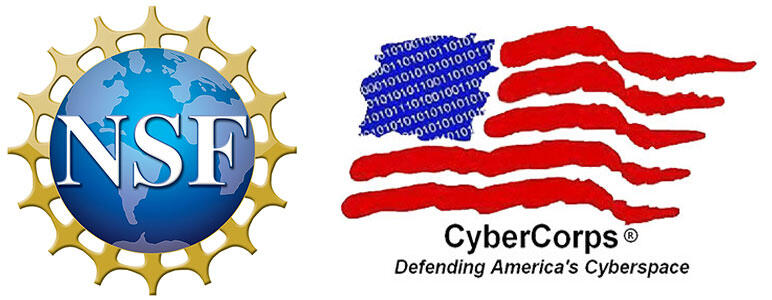The application for spring and fall 2026 is now open. Applications for spring will be reviewed immediately. The deadline for fall applications is February 1, 2026. Should there not be enough time to process spring 2026 applications, they will automatically be considered for fall 2026.
Background
In 2023, UNLV received grant funding from the National Science Foundation (NSF) to create the university’s first CyberCorps Scholarship for Services (SFS) program. The program seeks to develop a superior cybersecurity workforce, specifically to meet the needs of Federal, State, local and tribal governments with a special emphasis on working for the federal executive branch of government.
A highly competitive scholarship for students pursuing degrees in the cybersecurity field, the program provides for full tuition and academic fees, in addition to an annual stipend for living expenses and a professional allowance. In return for the financial support, recipients must agree to work for the U.S. Government after graduation in a cybersecurity-related position, for a period equal to the length of the scholarship.
Scholarship Benefits
- Full tuition and academic fees.
- Annual stipend for living expenses ($27,000 per year for undergraduate students and $37,000 per year for graduate students).
- Professional allowance of up to $6,000 per year (travel to the SFS Job Fair, books, certifications, conference fees, etc.)
- Internship opportunities with federal agencies through the national SFS network.
Eligibility Requirements
- U.S. Citizen
- A full-time student at UNLV pursuing a B.S., M.S. or Integrated BS-MS degree in Computer Science, or an M.S. degree in Cybersecurity, with an interest to focus on AI and/or machine learning. External non-UNLV undergraduate applicants must be able to meet and complete the UNLV BS in Computer Science degree requirements, including math courses, within the scholarship period.
- Must be going into at least the Sophomore year of a Bachelor’s degree or the first year of a Master’s.
- Must have and maintain a cumulative 3.5 GPA (evaluated every semester).
- Able to meet Federal, State, or local government employment selection criteria, including the ability to obtain a Security Clearance.
- If accepted, must commit to working at a government agency for the amount of time the scholarship was awarded.
Obligations
- Complete a Computer Science or Cybersecurity degree program with an emphasis on AI and/or machine learning.
- Maintain a cumulative 3.5 GPA (evaluated every semester).
- Become a member of and actively participate in the UNLV Cyber Clinic and its activities including competitions, conferences, and hosted events.
- Participate in CyberCorps activities including SFS job fairs, conferences and other meetings.
- Accept no external employment of more than 10 hours per week.
- Search for and secure a summer internship with a Federal, State or local government in the area of cybersecurity.
- Search for and complete employment with a Federal, State or local government in the area of cybersecurity immediately following graduation. The length of employment must at least be equal to the duration of the scholarship.
Employment Questions
- What type of positions will fulfill my commitment obligations?
-
The program covers not only occupational series 2210, but also the array of series in which the duties require unique cyber security skills and knowledge to perform cyber risk and strategic analysis, incident handling and malware/vulnerability analysis, program management, distributed control systems security, cyber incident response, cyber exercise facilitation and management, cyber vulnerability detection and assessment, network and systems engineering, enterprise architecture, investigation, investigative analysis, and cyber-related infrastructure interdependency analyst.
- If I am employed full-time, am I eligible to apply? What if I am a current government employee?
-
- There is no policy against current employees applying for the scholarship. However, the monthly stipend is intended to provide a basic living allowance while in school. Outside work is generally limited to 10 hours per week, and anything more than 15 hours per week will make you ineligible for the stipend.
- If you are a current government employee, there is no guarantee you will return to the same agency where you were previously employed.
- There's no guarantee you will be able to stay in the same location.
- You do not receive a stipend during the summer months. Generally speaking, your 10-week summer internship will be paid employment. A few agencies offer unpaid internships, but we do not require the students to accept them, but you can if you choose to.
- What are my employment options that will satisfy the SFS requirement of service?
-
You can find a list of SFS Executive/Non-Executive Agencies listed online.
FAQ
A list of frequently asked questions and other pertinent information can be found on the OPM website.
How To Apply
You will need to upload the following PDF documents:
- A statement from the applicant not to exceed 500 words that briefly discusses the applicant’s motivation for applying, interest in cybersecurity, any past relevant experiences, and future plans.
- A copy of the student’s most current college transcript(s) (unofficial transcripts are acceptable)
- A current resume
Once selected for an in-person interview, the applicant may be requested to provide letters of recommendation or contact information for at least one academic reference, one professional reference and one personal reference.
